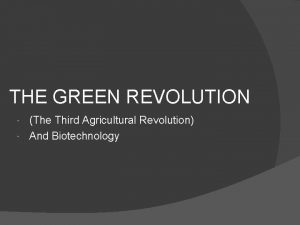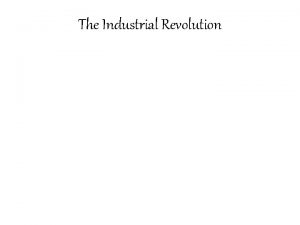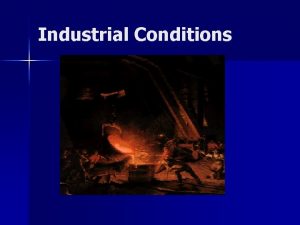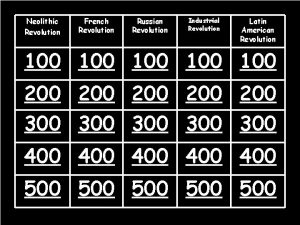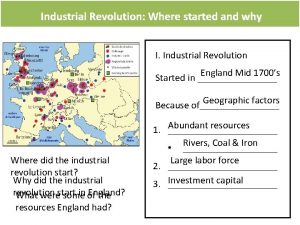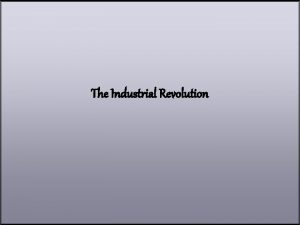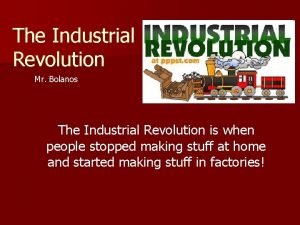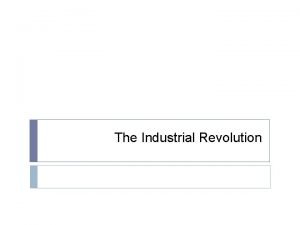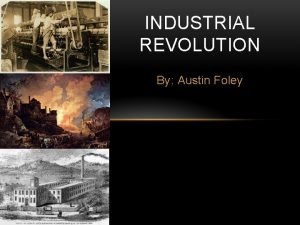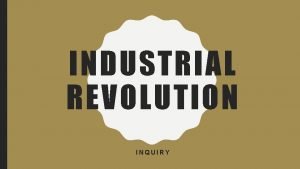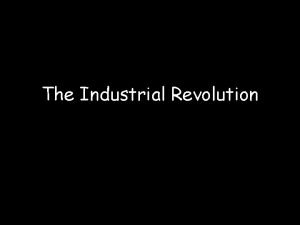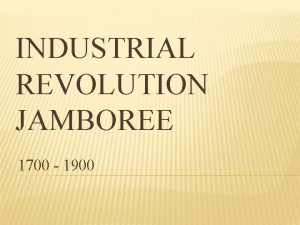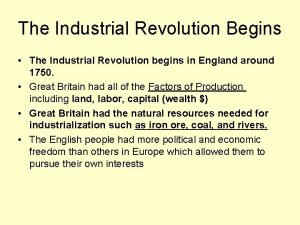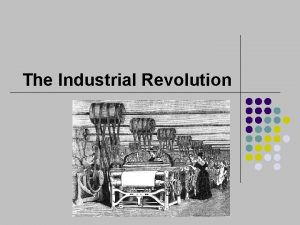Industrial Revolution Industrial Revolution The IR started when

































- Slides: 33

Industrial Revolution

Industrial Revolution The IR started when people stopped making products at home and started making products faster, cheaper, and better in factories.

For hundreds of years there was very little change in technology in Europe. People lived and worked with the same simple tools that their ancestors had used. . Little had changed since the time the ancient Romans lived 1, 500 years before.

Cottage Industries Candles lit homes, animals provided help for transportation, and craftsmen used their skills to make hand-constructed goods in their homes or small shops.

Even books were written and illustrated by hand. Look at the beautiful writing and illustrations of the pages in the books on the next slides. They are from the Book of Words



In the mid-1700 s life began to change in Europe. The Industrial Revolution began. This was a revolution of inventiveness. The change started slowly, but rapidly began to spread throughout the world.

The age of the machine had begun and life would NEVER be the same!

Many new inventions helped get the Industrial Revolution started Including:

Spinning Jenny Advances in Textiles The Spinning Jenny spun thread faster

Cotton gin • Eli Whitney’s cotton gin removed the seeds out of raw cotton saving time and labor.



Steam Engine • The steam engine could be used as a transportation device in trains and ships. • Or to run entire factories that made products.

Steam engine

Factory system Factories were built near areas that had natural resources where power machines could make goods

Advances in Transportation

Railroads • With the invention of the steam engine, trains and railroads became an efficient way to move people and products across the country.

Transcontinental RR • The transcontinental railroad made travel across the country faster, cheaper and more efficient.


• The transcontinental RR met in Utah


In addition to trains, ships could also move goods more quickly with the new engines.

Canals • Canals are manmade waterways dug between 2 large bodies of water. • Canals shortened the routes between ports. • The Erie Canal was a short cut from the Atlantic Ocean to the Great Lakes.

Erie Canal 1825

Panama Canal • The Panama Canal was a shortcut from the Atlantic to the Pacific (or backwards).

Telegraph Advances in Communication • Samuel Morse invented the telegraph. It communicated using a series of beeps (Morse code).

Telephone • Alexander Graham Bell invented the telephone.

Light Bulb • Thomas Edison invented the light bulb which allowed factories to work at night.

Motion picture camera Edison’s inventions

Phonograph

Development of Cities Workers from farms came to the factories to work and live. Modern cities began to develop around the new factories.
 How to take miracle seed
How to take miracle seed Could the french revolution have been avoided
Could the french revolution have been avoided Definition of third agricultural revolution
Definition of third agricultural revolution Russian revolution vs french revolution
Russian revolution vs french revolution Lời thề hippocrates
Lời thề hippocrates Tư thế worms-breton
Tư thế worms-breton đại từ thay thế
đại từ thay thế Vẽ hình chiếu đứng bằng cạnh của vật thể
Vẽ hình chiếu đứng bằng cạnh của vật thể Quá trình desamine hóa có thể tạo ra
Quá trình desamine hóa có thể tạo ra Thế nào là mạng điện lắp đặt kiểu nổi
Thế nào là mạng điện lắp đặt kiểu nổi Khi nào hổ mẹ dạy hổ con săn mồi
Khi nào hổ mẹ dạy hổ con săn mồi Các châu lục và đại dương trên thế giới
Các châu lục và đại dương trên thế giới Dạng đột biến một nhiễm là
Dạng đột biến một nhiễm là Nguyên nhân của sự mỏi cơ sinh 8
Nguyên nhân của sự mỏi cơ sinh 8 Bổ thể
Bổ thể Phản ứng thế ankan
Phản ứng thế ankan Thiếu nhi thế giới liên hoan
Thiếu nhi thế giới liên hoan Chúa yêu trần thế
Chúa yêu trần thế điện thế nghỉ
điện thế nghỉ Vẽ hình chiếu vuông góc của vật thể sau
Vẽ hình chiếu vuông góc của vật thể sau Một số thể thơ truyền thống
Một số thể thơ truyền thống Trời xanh đây là của chúng ta thể thơ
Trời xanh đây là của chúng ta thể thơ Sơ đồ cơ thể người
Sơ đồ cơ thể người Công thức tiính động năng
Công thức tiính động năng So nguyen to
So nguyen to đặc điểm cơ thể của người tối cổ
đặc điểm cơ thể của người tối cổ Tỉ lệ cơ thể trẻ em
Tỉ lệ cơ thể trẻ em Các châu lục và đại dương trên thế giới
Các châu lục và đại dương trên thế giới ưu thế lai là gì
ưu thế lai là gì Môn thể thao bắt đầu bằng chữ f
Môn thể thao bắt đầu bằng chữ f Tư thế ngồi viết
Tư thế ngồi viết Cái miệng bé xinh thế chỉ nói điều hay thôi
Cái miệng bé xinh thế chỉ nói điều hay thôi Hình ảnh bộ gõ cơ thể búng tay
Hình ảnh bộ gõ cơ thể búng tay Mật thư anh em như thể tay chân
Mật thư anh em như thể tay chân
